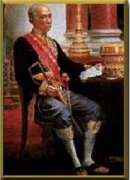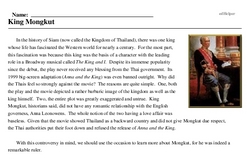King Mongkut
King Mongkut
Reading Comprehension for October 18
In the history of Siam (now called the Kingdom of Thailand), there was one king whose life has fascinated the Western world for nearly a century. For the most part, this fascination was because this king was the basis of a character with the leading role in a Broadway musical called The King and I. Despite its immense popularity since the debut, the play never received any blessing from the Thai government. Its 1999 big-screen adaptation (Anna and the King) was even banned outright. Why did the Thais feel so strongly against the movie? The reasons are quite simple. One, both the play and the movie depicted a rather barbaric image of the kingdom as well as the king himself. Two, the entire plot was greatly exaggerated and untrue. King Mongkut, historians said, did not have any romantic relationship with the English governess, Anna Leonowens. The whole notion of the two having a love affair was baseless. Given that the movie showed Thailand as a backward country and did not give Mongkut due respect, the Thai authorities put their foot down and refused the release of Anna and the King.
With this controversy in mind, we should use the occasion to learn more about Mongkut, for he was indeed a remarkable ruler.
Mongkut was born on October 18, 1804, as the 43rd child of King Rama II of the Chakri dynasty. Though he had many older siblings, he was the first son to be born of a queen. Therefore by law, he would have been the first in line for the throne. But, unfortunately for him, things did not go as planned. When Mongkut was twenty years old, his father fell ill and passed away. At the time, the royal succession council felt that the crown prince was still too young and inexperienced to take the throne. Hence, instead of following the protocol, they decided to bypass him and let his half-brother Nangklao be the new king (Rama III). Surely, Mongkut must have been disappointed by the outcome. But he accepted it gracefully. For the next twenty-seven years, he was a devoted Buddhist monk. He took his vows seriously and led a strict, humble life. He eventually came to establish his own sect of Buddhism (Thammayut Nikaya), which still commands a large following today.




